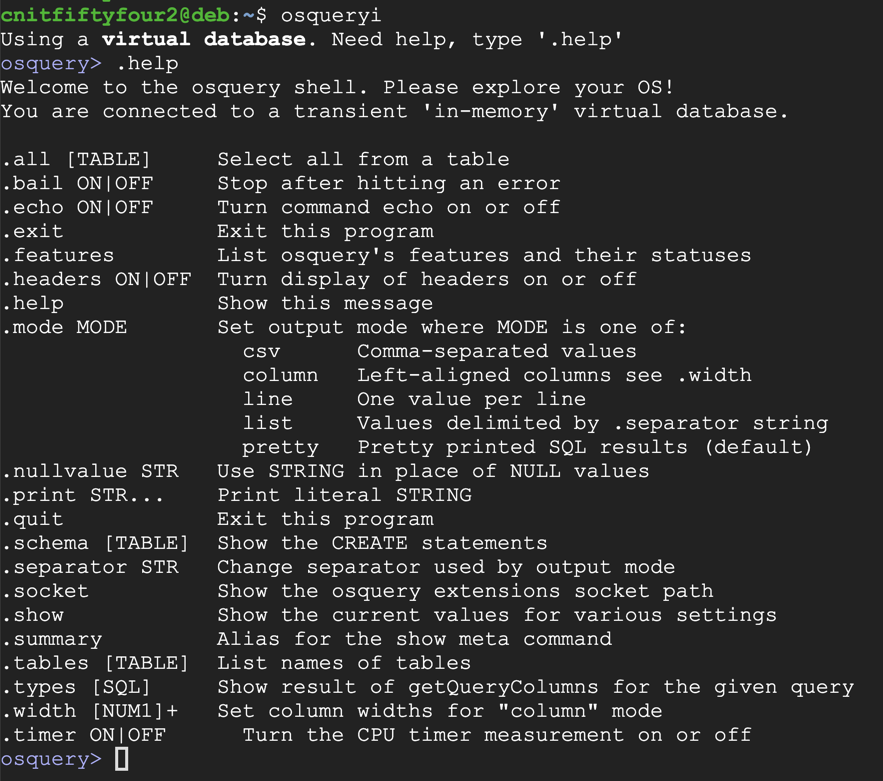
sudo apt update
sudo apt install dirmngr software-properties-common -y
sudo apt install apt-transport-https -y
sudo apt-key adv --keyserver keyserver.ubuntu.com --recv-keys 1484120AC4E9F8A1A577AEEE97A80C63C9D8B80B
sudo add-apt-repository 'deb [arch=amd64] https://pkg.osquery.io/deb deb main'
sudo apt update
sudo apt install osquery -y
osqueryi
.help

.tables
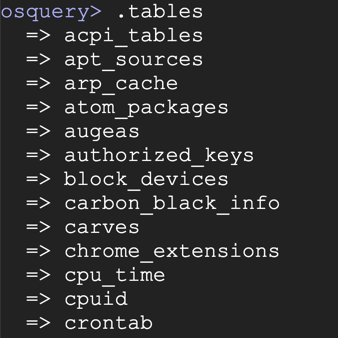
.all apt_sources
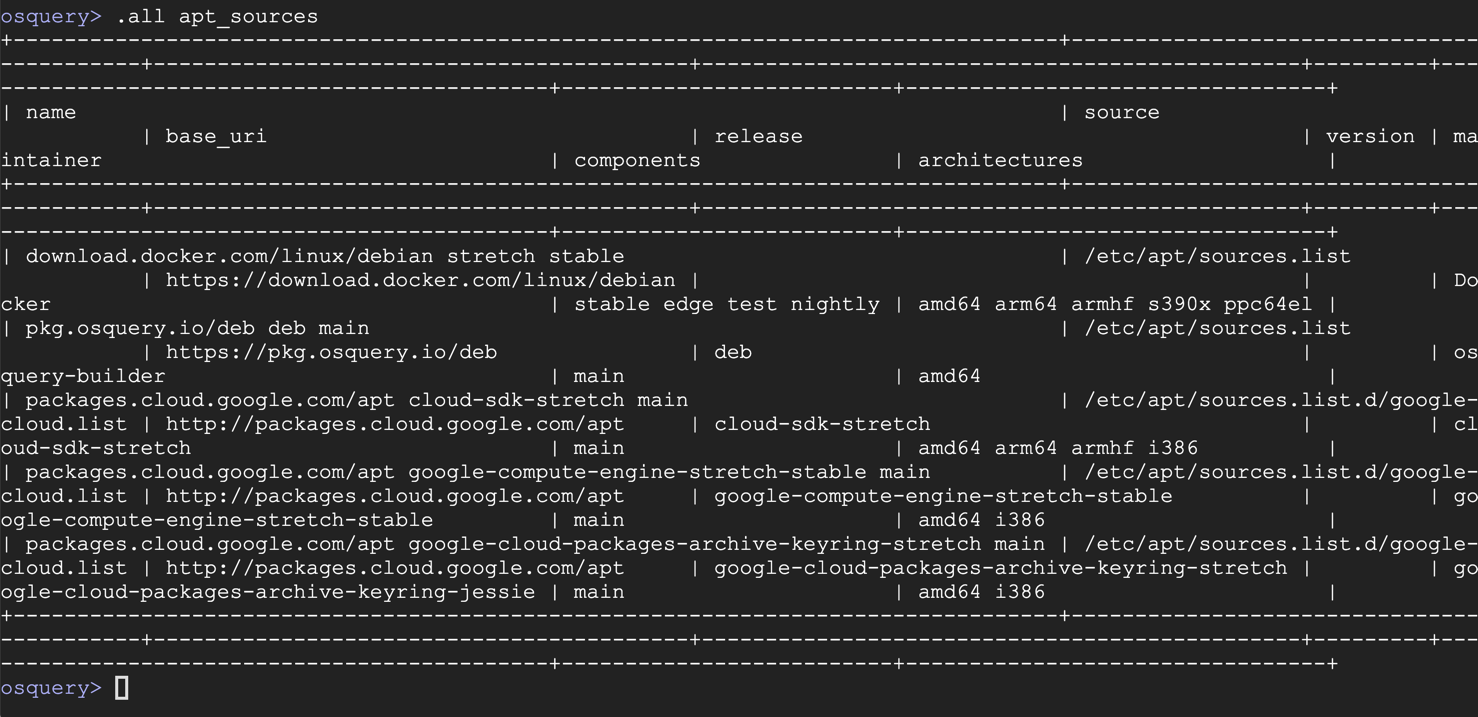
arp_cache
uptime
users
shell_history
crontab
kernel_info
logged_in_users
memory_info
suid_bin
os_version

.quit
sudo apt install rsyslog -y
sudo nano /etc/rsyslog.d/osquery.conf
template(
name="OsqueryCsvFormat"
type="string"
string="%timestamp:::date-rfc3339,csv%,%hostname:::csv%,%syslogseverity:::csv%,%syslogfacility-text:::csv%,%syslogtag:::csv%,%msg:::csv%\n"
)
*.* action(type="ompipe" Pipe="/var/osquery/syslog_pipe" template="OsqueryCsvFormat")

Save the file with Ctrl+X, Y, Enter.
On your Linux machine, execute these commands:
sudo systemctl restart rsyslog
sudo nano /etc/osquery/osquery.conf
{
"options": {
"config_plugin": "filesystem",
"logger_plugin": "filesystem",
"logger_path": "/var/log/osquery",
"disable_logging": "false",
"schedule_splay_percent": "10",
"pidfile": "/var/osquery/osquery.pidfile",
"events_expiry": "3600",
"database_path": "/var/osquery/osquery.db",
"verbose": "false",
"worker_threads": "2",
"disable_events": "false",
"disable_audit": "false",
"audit_allow_config": "true",
"host_identifier": "hakase-labs",
"enable_syslog": "true",
"syslog_pipe_path": "/var/osquery/syslog_pipe",
"force": "true",
"audit_allow_sockets": "true",
"schedule_default_interval": "3600"
},
"schedule": {
"crontab": {
"query": "SELECT * FROM crontab;",
"interval": 300
},
"system_info": {
"query": "SELECT hostname, cpu_brand, physical_memory FROM system_info;",
"interval": 3600
},
"ssh_login": {
"query": "SELECT username, time, host FROM last WHERE type=7",
"interval": 360
}
},
"decorators": {
"load": [
"SELECT uuid AS host_uuid FROM system_info;",
"SELECT user AS username FROM logged_in_users ORDER BY time DESC LIMIT 1;"
]
},
"packs": {
"osquery-monitoring": "/usr/share/osquery/packs/osquery-monitoring.conf"
}
}
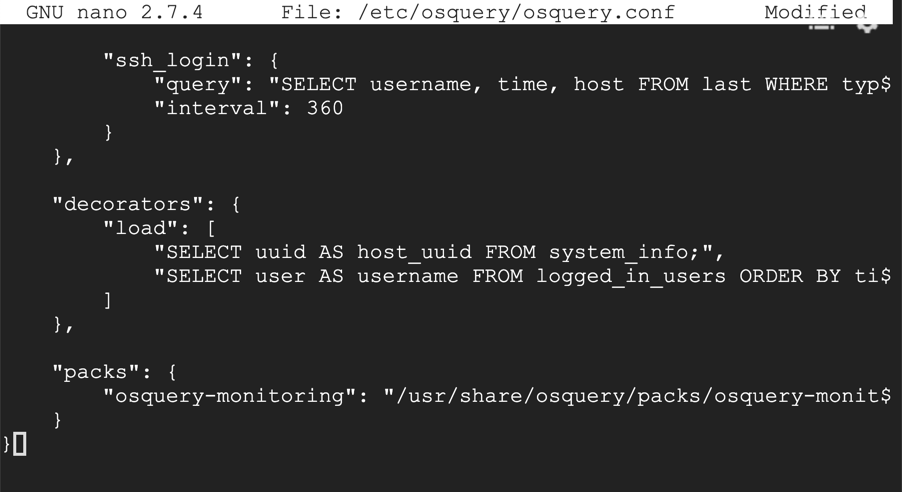
Save the file with Ctrl+X, Y, Enter.
sudo osqueryctl config-check

On your Linux machine, execute these commands:
sudo systemctl start osqueryd
sudo systemctl enable osqueryd
sudo systemctl restart rsyslog

On your Linux machine, execute this command:
sudo nano /usr/share/osquery/packs/fim.conf
{
"queries": {
"file_events": {
"query": "SELECT * FROM file_events;",
"removed": false,
"interval": 300
}
},
"file_paths": {
"homes": [
"/home/%/.ssh/%%"
],
"etc": [
"/etc/%%"
],
"home": [
"/home/%%"
],
"tmp": [
"/tmp/%%"
]
}
}
On your Linux machine, execute this command:
sudo nano /etc/osquery/osquery.conf
"packs": {
"osquery-monitoring": "/usr/share/osquery/packs/osquery-monitoring.conf",
"fim": "/usr/share/osquery/packs/fim.conf"
}

Save the file with Ctrl+X, Y, Enter.
sudo systemctl stop osqueryd
sudo osqueryctl config-check

sudo systemctl restart osqueryd
sudo tail -f /var/log/osquery/osqueryd.results.log
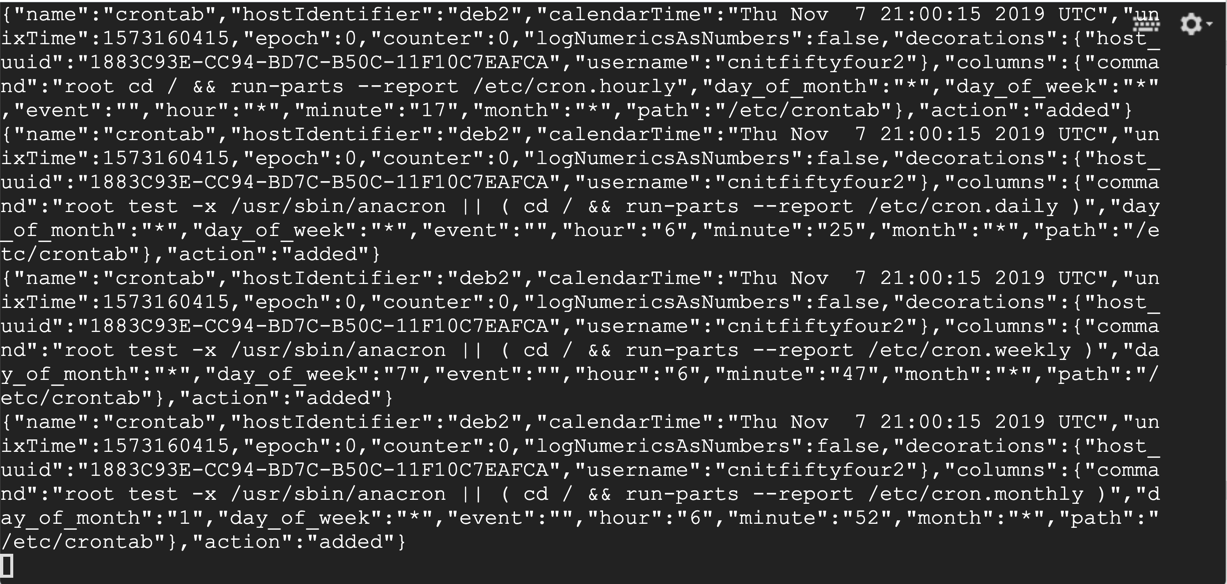
Leave this window open with the "tail" command running.
touch /tmp/AAAAAAAAAAAAAAAAAAAAAAAAAAAAAAAAAABBB

Posted 11-7-19
stop command added 6-28-2020
apt-transport-https added 9-17-20